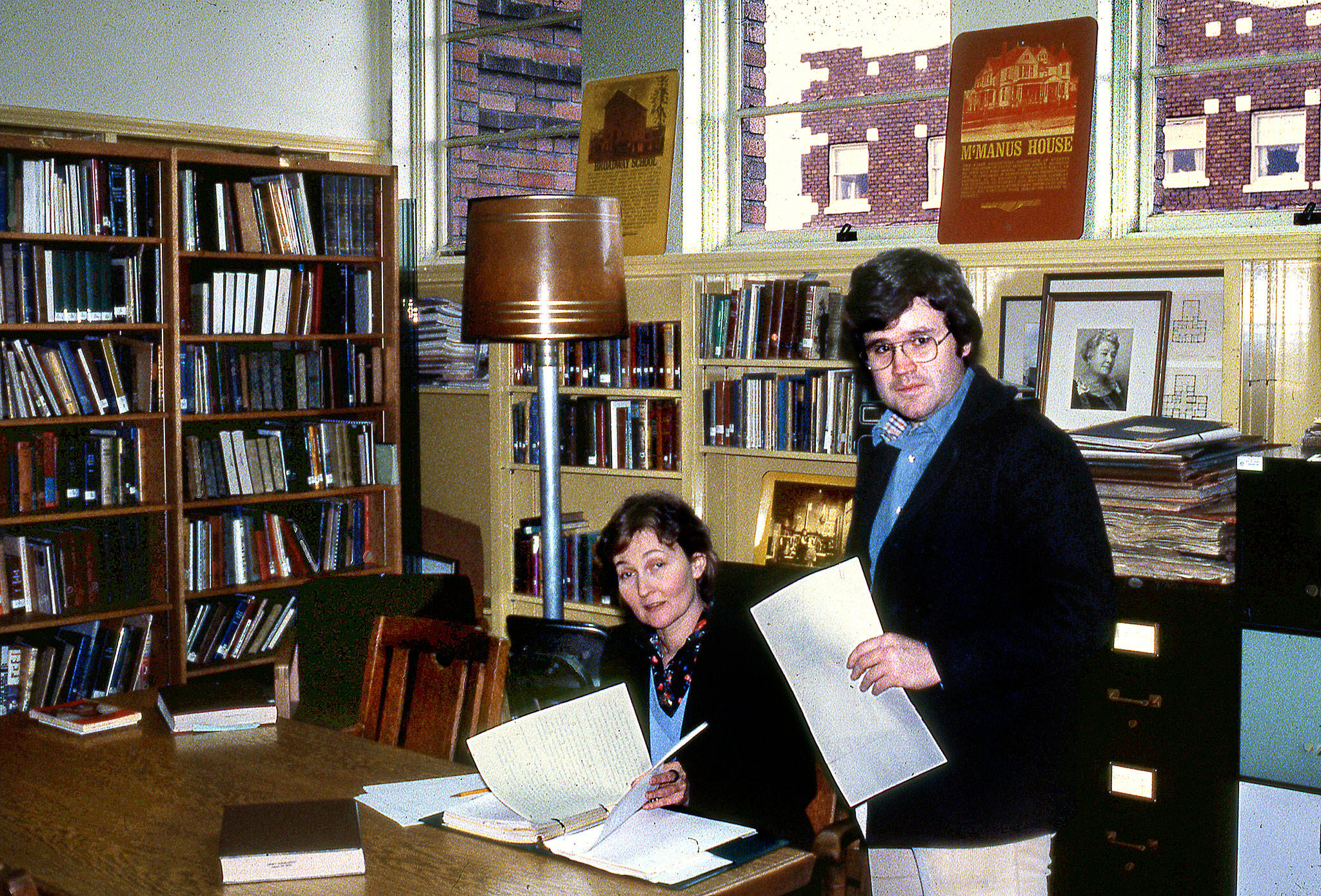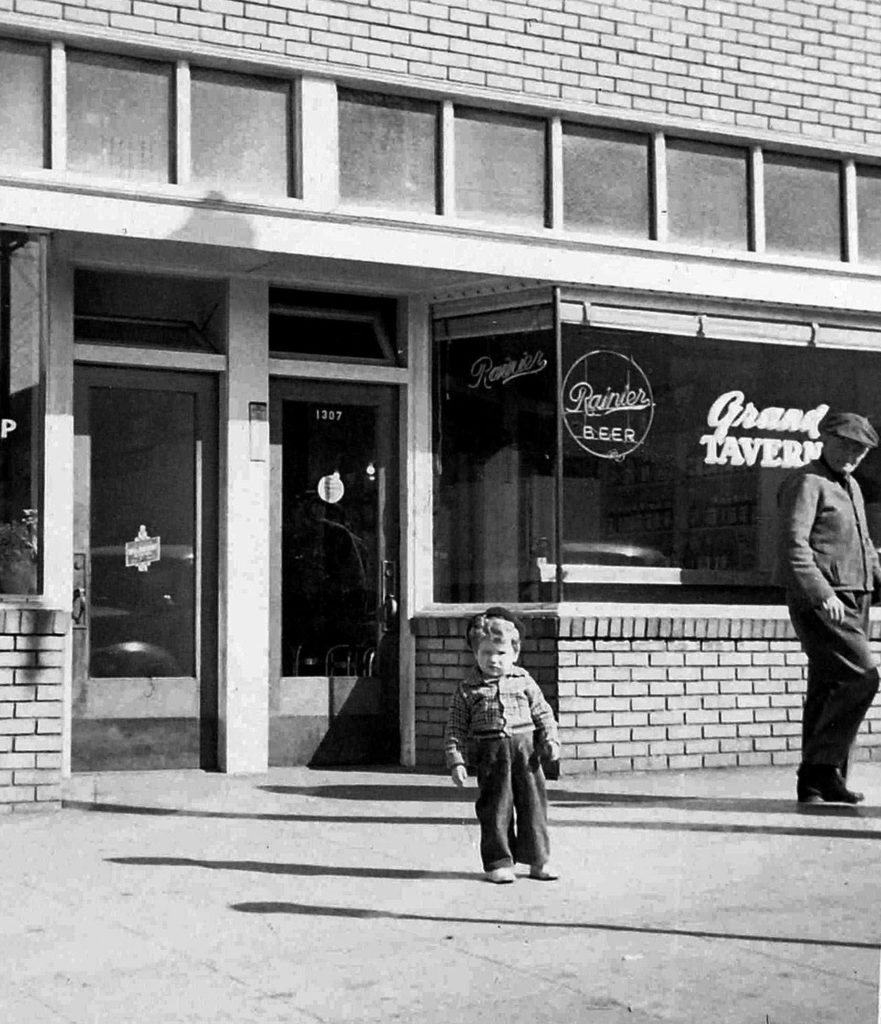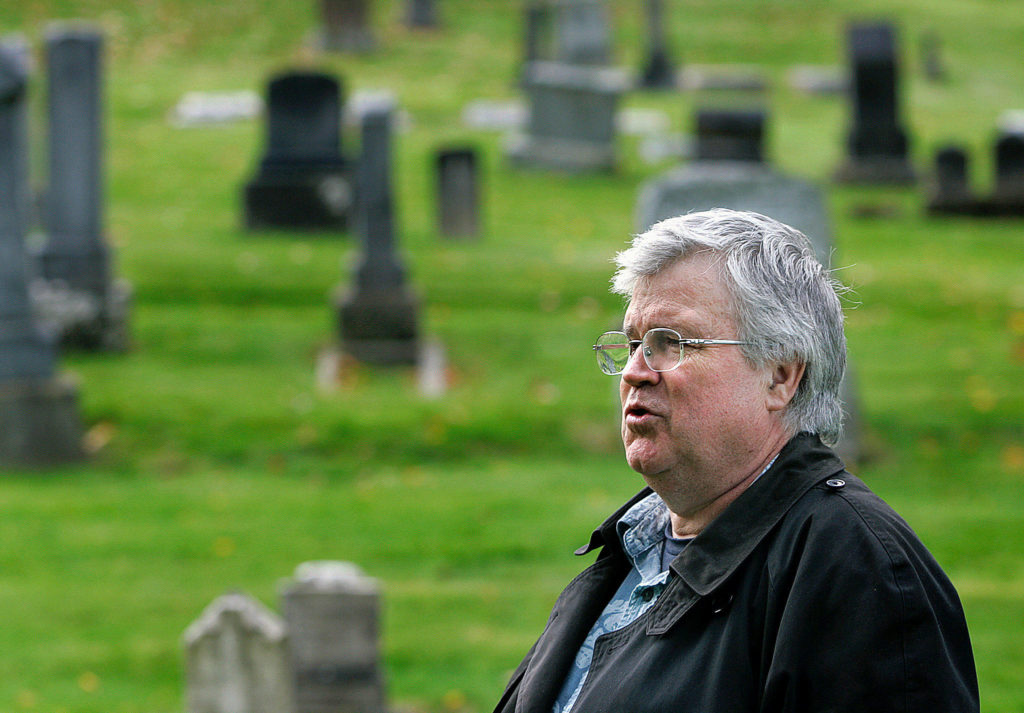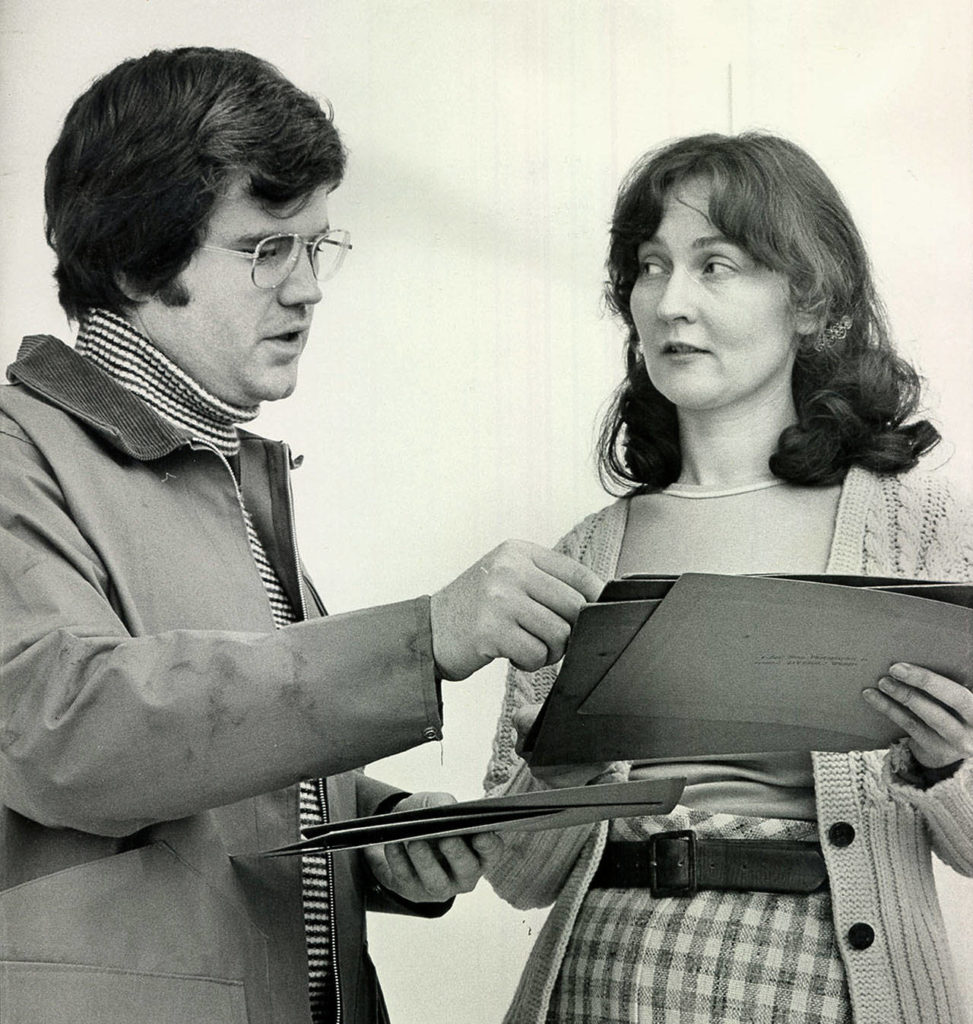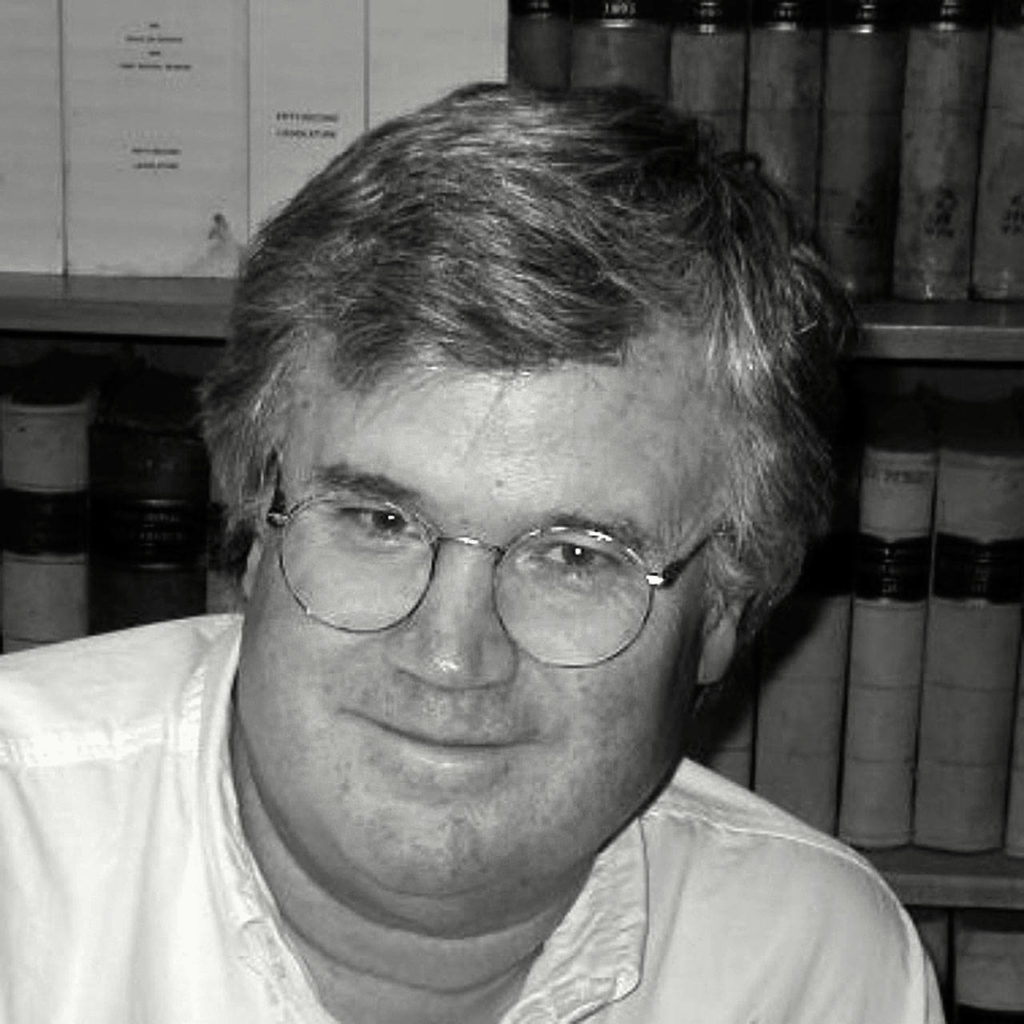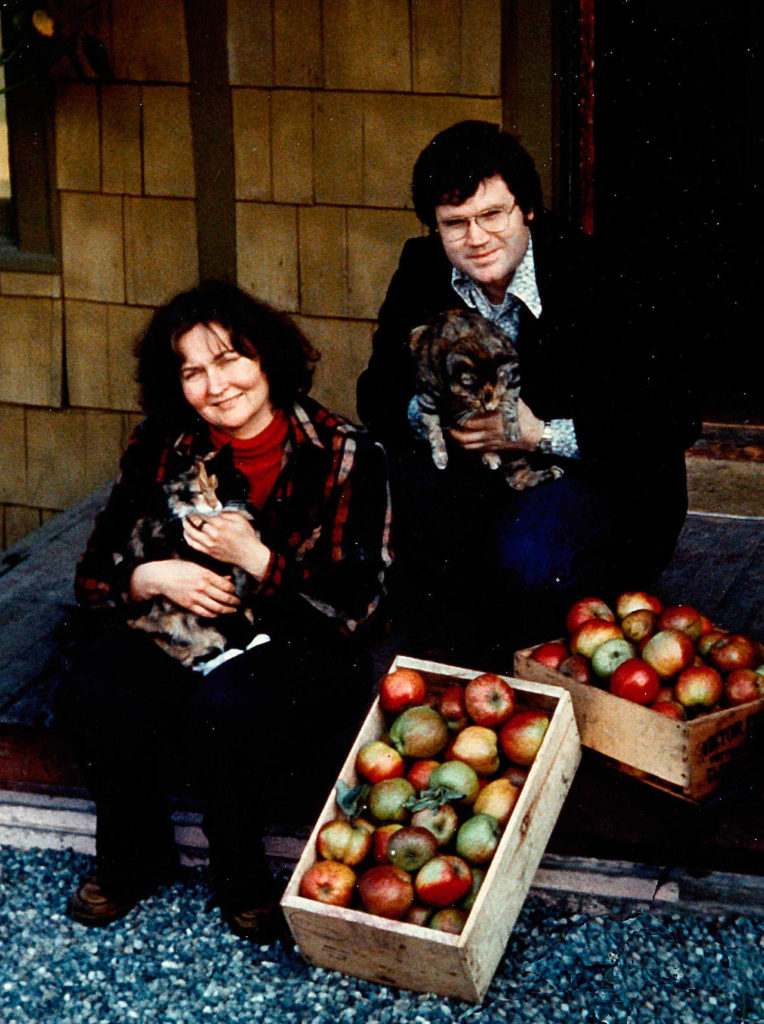EVERETT — David Dilgard was more than a walking-talking search engine of regional history.
With wit and charm, the homegrown historian with the Everett Public Library was an author, lecturer and defender of old buildings. He spent more than 40 years preserving Snohomish County’s past through relentless research and colorful storytelling.
Dilgard, 73, who had diabetes and a heart condition, died Thursday, a family member said. He was at his brother, Dana Dilgard’s, house on Narbeck Avenue, where David and his siblings grew up.
“He was the undisputed master of all the local historians,” said Jack O’Donnell, who wrote a “Seems Like Yesterday” history column for The Daily Herald between 1990 and 2015.
When O’Donnell gave talks to local groups, the retired history teacher would preface his remarks with a disclaimer: “If I tell you something and David Dilgard says anything else, David is right.”
Dilgard typically made more than 50 presentations a year for local schools, service clubs and other organizations. He led tours of the downtown and Evergreen Cemetery, providing remarkable and often entertaining detail.
No one knew more about the city’s founding fathers than Dilgard. He was an expert on the Everett Massacre, a deadly waterfront confrontation more than a century ago. Labor strife and street speakers in Everett in 1916 sparked the shootout that killed two citizen deputies and at least five but likely more Industrial Workers of the World members, known as Wobblies.
It was a seldom-discussed black eye on Everett for decades. Dilgard’s interest in unearthing the truth began before his teens and included interviews with witnesses and sympathizers from both sides over many decades.
A history specialist at the Everett Public Library, Dilgard retired March 22, 2017, 40 years to the day from when he started.
Historian Margaret Riddle, who retired from the library in 2008, spent her career working with Dilgard. Together, they created the library’s Northwest History Room.
Riddle and her husband, Randy, met Dilgard in 1969 in Seattle. It was during the Vietnam War era. Dilgard was working at a draft counseling center and as an artist, painting and sculpting in Seattle. He had attended Rosehill School in Mukilteo and Everett’s Cascade High.
“We were all looking for jobs, but were more interested in creating our own,” said Riddle, who had come to Seattle after earning a master’s degree in Michigan.
“David knew architecture and he knew the area, so he started doing survey work,” she said. The city planning department hired them to do a 1973 survey of Everett’s shoreline and a survey of its historical properties in 1976.
By 1977, they had jobs at the library with federal grant money. Mark Nesse, the library director from 1977 to 2007, respected their work and found a way to keep them on.
Dilgard’s public speaking skills and hometown connections matched well with Riddle’s expertise in research and working with photo collections. They gathered oral histories of Everett’s elders, with Dilgard doing many of the interviews.
“He was very playful with it, and that playfulness and creativity drew a lot of people in,” Riddle said.
“He was a talented guy, a good soul, and he left an important legacy. There is a joy in that,” she said. Among their happiest times in the Northwest Room were mornings before the library opened. “Both of us were sharing what we had found the previous day. There was always an excitement about that.”
In 2008, Dilgard received the Robert Gray Medal from the Washington State Historical Society. He was also honored, in 2007, with a lifetime achievement award from the League of Snohomish County Heritage Organizations. And in 2017, he was given a William F. Brown Award by the Everett Historical Commission.
“David was one of the best local historians in the United States, a walking community archivist,” said Peter Jackson, of Seattle.
As the son of U.S. Sen. Henry M. “Scoop” Jackson, an Everett native who died in 1983, Peter Jackson had a childhood divided between here and Washington, D.C.
“It was David who fostered my interest in Everett’s ‘Free Speech Corner’ and the forces that led up to the 1916 Everett Massacre,” Jackson said. “And it was David who, in his animated storytelling style, breathed life into Everett’s landmarks, which the city had an appetite for tearing down.”
Dilgard was well-regarded by the Tulalip Tribes.
“He was a legend with the Tulalip people,” said Tessa Campbell, senior curator at the Hibulb Cultural Center & Natural History Preserve. “He presented at Hibulb and the room was past maximum occupancy. Such a loss to the community.”
The library’s Mindy Van Wingen and Lisa Labovitch credit Dilgard with much of what they’ve learned about Everett history.
“For us, coming in new to Everett and as younger historians, he was such a champion and such a teacher,” said Van Wingen, now the library’s assistant director. Labovitch is in Dilgard’s former role in the Northwest Room.
Van Wingen fondly remembers working on an Evergreen Cemetery podcast a decade ago. As she drove back, Dilgard kept suggesting stops along the way.
“He said, ‘I want to show you where Ken Griffey Jr. hit his first homer.’ Then it was Scoop Jackson’s first home,” Van Wingen said. “I later realized how lucky I was to have that experience, me driving him around town and him telling me all these stories.”
Van Wingen said Dilgard could bring people of the past to life and admired how generous he was with his knowledge.
“The library and the community were just so lucky,” she said. “I don’t think every community had their own David. Everett did.”
Born April 4, 1945, Dilgard was the son of Roy and Bertha Dilgard and the eldest of three children. Along with his wife, Marni Dilgard, and her children, he is survived by his brother, Dana Dilgard, sister, Claudia Dilgard, and brother-in-law, David Blacker.
“We grew up together,” said Blacker, who recalls watching the 1950s “Adventures of Superman” TV show with Dilgard.
They remained close friends, and Blacker, who has been involved in local theater, featured Dilgard in productions at the old Rosehill Community Center. In the 1990s, Dilgard had roles in “The Foreigner,” “One Flew Over the Cuckoo’s Nest” and other shows.
“A guy like that ends up being the star no matter what the role,” Blacker said. “The guy was brilliant, a Renaissance man.”
Others marveled at Dilgard’s extensive knowledge of Elvis Presley, Muhammad Ali, French and English architecture, local minor league baseball and countless other subjects.
Dilgard could play guitar like Eric Clapton, Blacker said, but didn’t like performing for others.
“I don’t think you could find anybody who would say an unkind word about him,” Blacker said. “It’s a loss for everybody in town.”
Like his brother, Jack O’Donnell, Larry O’Donnell grew to love local history and frequently consulted with Dilgard.
He remembers him as more than a diligent and objective researcher.
“He was patient and kind and considerate of others and so humble,” O’Donnell said. “I always thought I underthanked him, but he was just so modest.”
O’Donnell was impressed by how Dilgard could relate to a wide range of people, be it a doctoral student working on a thesis, a third-grader from Whittier Elementary or the guy who wanted to know if his dad might have cut shingles at the Roland Hartley mill.
For all his knowledge, perhaps his greatest gift was inspiring others to make their own journeys into the past.
“He didn’t just dole out information,” O’Donnell said. “He really encouraged people to be discoverers of history.”
Eric Stevick: 425-339-3446; stevick@heraldnet.com.
Talk to us
> Give us your news tips.
> Send us a letter to the editor.
> More Herald contact information.
